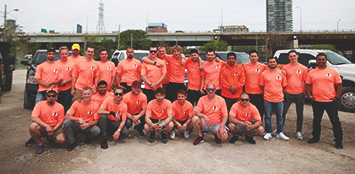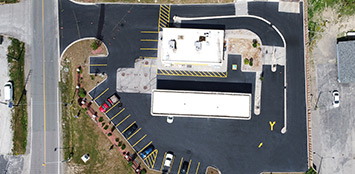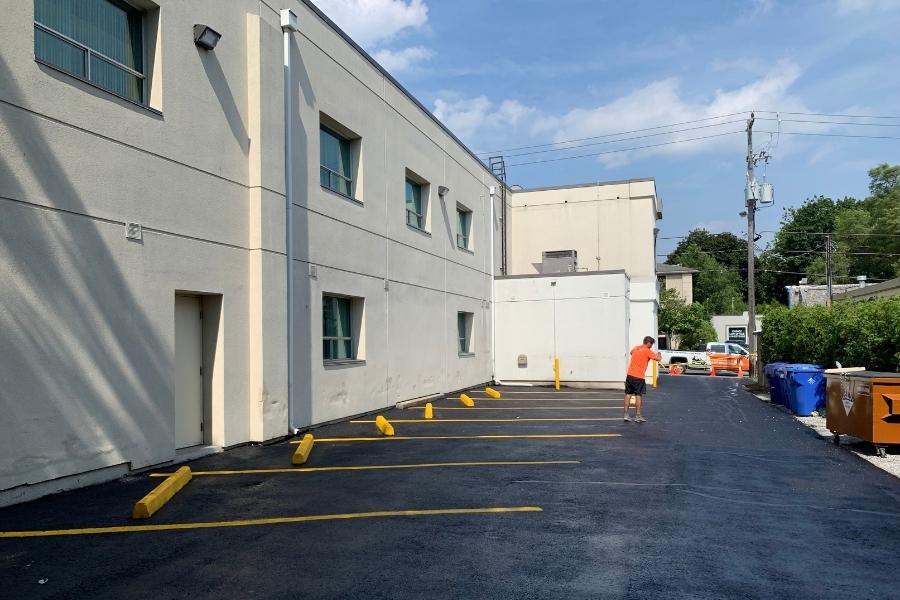You’ve just gotten your driveway sealed and it’s looking beautiful! You want to keep that beauty and functionality for years to come but without proper maintenance your beautiful driveway could last 5 to 7 years, whereas well maintained asphalt can last 15 to 30 years! Although asphalt pavement is extremely strong and versatile, it’s important to know how to properly maintain it, to keep your asphalt looking great and longer lasting.
Do Give Your Asphalt Time To Cure
It’s important to wait until your asphalt is fully dry before driving on it. Usually the drying process takes about 24 hours after pouring the asphalt, but your asphalt will not reach its maximum strength and resistance until the asphalt has been fully cured, a process that can take a year to fully complete. That doesn’t mean you can not drive on your pavement for a year but there are some preventative measures you can take to protect your asphalt from getting damaged in the meantime, such as monitoring the weight of vehicles being parked on the asphalt. For optimal results, keeping large trucks like garbage trucks off your driveway ensures that your driveway has optimal time to cure. Also ensure that while your asphalt is curing, to minimize actions such as turning your steering wheel while the car is stopped to ensure there are no marks or cracks left while the asphalt cures. Make sure your asphalt pavement is properly cared for with a free estimate.
Do Clean Up Oil Stains Regularly
Oil and other motor vehicle fluid can be extremely damaging when it comes to maintaining your asphalt driveway. When oil is spilled onto asphalt pavement it causes extreme irreversible damage to the pavement. Due to the chemicals that are found in oil, if not treated properly and left on the pavement for long periods of time, the asphalt can start to decompose and crack at an exponential rate due to the lack of integrity left by the oil stain. If oil is found on your asphalt, some appropriate ways to remove the stains are:
- Applying a liberal amount of dish soap as well as a little bit of water can do wonders for removing oil stains from your pavement. Pour the dish soap and some water over the stain and with a hard bristle brush, scrub the pavement and rinse to remove the suds. Repeat this process until the stains are completely removed.
- Another popular way to remove oil from your driveway is to apply cat litter to the affected area. While not the most conventional method of cleaning, cat litter can be extremely effective when it comes to cleaning oil and grease stains from pavement. Mop the affected area with water and then proceed to apply a fair amount of cat litter on top of the selected area. Stomp on the cat litter to ensure it reaches deep into the surface of the asphalt and let it sit for a day before rinsing the cat litter off the oil spill.
The best preventative measure is making sure your asphalt pavement is properly sealed. To learn more about asphalt sealing and why it’s right for you, contact us today for your free estimate.
Do Not Let Cracks Go Unnoticed
Be sure to be mindful of new cracks and potholes that may appear in your asphalt. Cracks can be caused by many things, the leading cause of which is moisture. Moisture can seep into your pavement and cause the sand and gravel base that asphalt relies on to wash away and crack. If your pavement already has cracks in it, moisture can cause even more irreversible damage causing the water to leak into the existing cracks and crevices and break them down, which amplifies the damage of the pavement. We recommend keeping a close eye for these damages and applying a sealcoat to your asphalt driveway to protect it from damaging UV rays as well as vehicle fluids and moisture. If you own a commercial, industrial or residential property, contact us about best practices when it comes to protecting your asphalt.
Don’t Ignore Weeds Growing Out Of Your Driveway
Another damaging agent of asphalt pavement can be weeds and grass growing out of the crevices of asphalt. Weeds can be extremely harmful to already damaged asphalt and are even harder to get rid of once they’re rooted. Weeds can push their way through cracks and damage the asphalt pavement even further which can cause in worst case scenarios, collapsing and crumbling of the pavement. Thankfully there are remedies to manage and get rid of pesky weeds growing in your driveway such as applying handy commercial weed killer to get rid of them as well as using more unconventional, non-toxic methods such as boiling water and using a mixture of vinegar and dish soap to kill the weeds and reduce the damage they can cause to your driveway. Another way to properly ensure that there are no weeds or grass growing out of your asphalt driveway is to ensure that your pavement is properly protected with sealcoating, which can also protect against unwanted greenery growing out of your driveway. If you’re a residential or commercial property owner and notice unwanted weeds growing out of your asphalt, contact us for your free estimate.
Contact Asphalt Sealing for any Questions you might have!
We hope this was helpful and informative! If you have any questions or need some guidance, feel free to contact us or give us a call and we would be happy to help you. Asphalt Sealing – 647-812-7845.



